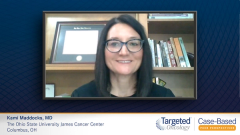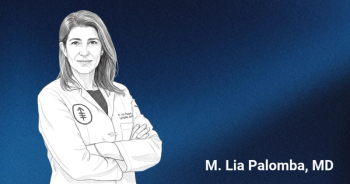
Clinical Pearls in Management of Relapsed/Refractory Follicular Lymphoma
Citing clinical pearls from her own experience in working with patients with relapsed/refractory follicular lymphoma, Kami Maddocks, MD, gives advice to colleagues in their efforts to combat follicular lymphoma.
Episodes in this series

Kami Maddocks, MD: I think some of the most important things to recognize when you’re treating patients with follicular lymphoma [LF], number 1, is defining when they present with FL and if they require therapy or not. As I mentioned, treating patients just because they have FL does not improve their survival, but it does expose to them toxicities of therapy. Therefore, making sure that in patients who are asymptomatic with low tumor burden, who do not need treatment, that it’s OK to observe these patients until they meet indications or have symptomatic disease that require treatment. I think ruling out transformed disease is very important in FL, so those patients who present with B symptoms with a very high LDH [lactate dehydrogenase], using the PET [positron emission tomography] scan to determine if there’s an area that has an SUV [standard uptake value] out of proportion to other areas, so that can be biopsied to rule out transformed disease, because these patients, if they have transformed disease, need anthracycline-based therapy.
I think in those patients who do not respond to initial therapy like they should, so not achieving complete remission or they relapse within that 2-year time frame, number 1 again, is reassessing the nature that they don’t have transformation at this time. Because, that has been shown that a certain proportion of those patients will have transformed disease. Then, consideration of referring them for a clinical trial, and just recognizing that those patients have a worse overall survival [OS] than other patients with FL. It’s important to make sure that if there’s a trial available, that they would be able to be treated on thinking about CAR [chimeric antigen receptor] T in some of these early relapse patients and referring them for that. Lastly, as I mentioned that the median OS of FL is over 20 years, so when we’re considering different therapies, it’s also important to think about the toxicities of these therapies in the quality of life for a patient.
Transcript edited for clarity.
Case: A 74-Year-Old Man With Relapsed/Refractory Follicular Lymphoma
Initial presentation
- A 74-year-old man complains of a 6-month history of fatigue, occasional fevers, decreased appetite, fatigue, and an 8-lb weight loss
- PMH: unremarkable
- PE: palpable right axillary and cervical lymph nodes, palpable ~ 3 cm in both locations; spleen palpable 4.5 cm below left costal margin
Clinical Workup
- Labs: ANC 1.6 x 109/L, WBC 11.2 x 109/L, 44% lymphocytes, Hb 9.6 g/dL, plt 98 x 109/L, LDH 315 U/L, B2M 3.5 µg/mL; HBV negative
- Excisional biopsy of the axillary lymph node on IHC showed CD 20+, CD 3+, CD5+, CD 10+, BCL2+; follicular lymphoma grade 2
- Bone marrow biopsy showed paratrabecular lymphoid aggregates, 4% involvement
- Molecular genetics: t(14;18) (q32;q21)
- PET/CT showed enlargement of right axillary, cervical, and mediastinal lymphadenopathy (3.3 cm, 3.1, cm and 4.6 cm respectively)
- Ann Arbor Stage IV; ECOG 0
Treatment
- He was treated with R-CHOP for 6 cycles, achieved complete response and continued rituximab maintenance
- 24 months later he complained of increasing weight loss, fever and drenching sweats as well as more enduring fatigue and new onset itching; he was currently taking antibiotics for his 3rd bacterial infection in the past year
- Repeat PET/CT revealed progression of disease
- He was started on bendamustine + rituximab for 6 cycles and continued on rituximab maintenance
- Repeat lymph node biopsy grade 2 follicular lymphoma
- 12 months later he complained of continued weight loss, increased itching and worsening fatigue; recurrent infections continued
- He was started on idelalisib 150 mg PO BID



















